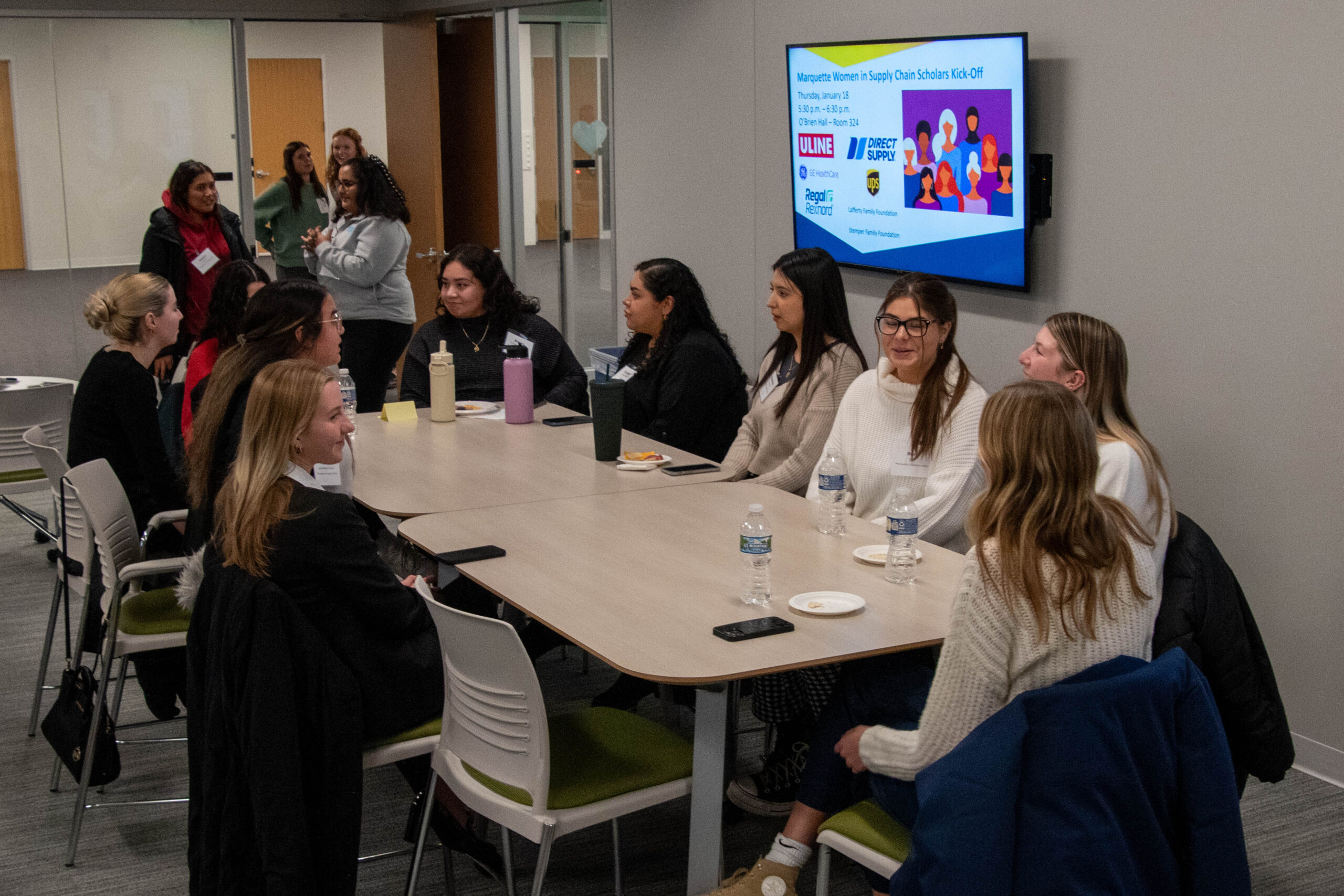Plenty of people go on brewery tours as an excuse to drink a pint or two of the latest craft beers.
Kelly Coughlin is just as interested in how the beer gets canned, what the cost of ingredients are and which distributors the brewery works with to get the product to customers.
“I always ask the toughest questions on brewery tours,” Coughlin says with a laugh.
That aptitude for supply chain comes in part from Coughlin’s time in the Marquette Women in Supply Chain Scholars program. Coughlin, who is now in the operations management development program at GE HealthCare, started her supply chain journey alongside roughly a dozen of her classmates in a semester-long program designed to cultivate female talent.
“This program opened my eyes to all the possibilities within supply chain,” Coughlin says. “We were exposed to a variety of functions within the business and we met with women leaders in all those areas.”
Founded in 2018 by Assistant Dean of Undergraduate Programs Beth Krey, the Women in Supply Chain Scholars group is open to female sophomores and juniors in the College of Business Administration. Those accepted to the program receive a $1,000 scholarship, invitations to industry site visits and the chance to network with local supply chain executives. Sponsors such as Uline, GE HealthCare, Milwaukee Tool and Direct Supply support the program with donations and host the scholars on their campuses.

While closing the gender gap is a priority in many professions, it is especially important to supply chain, which has traditionally lagged other business disciplines in female participation. Women make up just 39 percent of the supply chain workforce, per technological research firm Gartner, and barely over a quarter of C-suite roles.
“If you go all the way back to the roots of this industry, supply chain started out of a group of blue-collar workers,” says Craig Schaefer, a supply chain executive at GE HealthCare and a longtime supporter of the program. “That was a male-dominated environment and that filtered up through the leadership of these companies, which became all-male as well. Now we have the chance to diversify perspective and experience as we engage more women earlier in their careers.”
Kelly Wesolowski, associate director of the Center for Supply Chain Management and program adviser, encourages young women to consider a career in supply chain. A graduate of the College of Business Administration with a degree in marketing, Wesolowski worked in public health, the nonprofit sector and STEM recruiting before returning to her alma mater. If she had the chance to rewind her career, Wesolowski says she would consider following the same path the young women in her club are walking.
“I wish I would have majored in operations and supply chain,” Wesolowski says with a laugh. “It’s a great field because there are so many different areas of supply chain to go into and the roles offer great variety. If you like to organize and streamline processes, there is a job for you. If you like to analyze data, plan and forecast, there is another role. Or perhaps you like to negotiate deals and work with suppliers; there is a job for you there too. No matter what your personality is, there’s an opportunity for you that can suit your strengths and interests.”
Program sponsors see it as a way to attract talent long before they enter the job market. Coughlin, who already had an internship with GE HealthCare prior to her time in the club, deepened her relationship with the company through the new people she met as a supply chain scholar. She is now in a two-year rotational program that is giving her broad experience in the company.

This is exactly what Schaefer had in mind when he began supporting the club at its inception in 2018.
“I’m charged with developing an early career talent pipeline, so if I weren’t engaging at the university level, I’d be doing something wrong,” Schaefer says.
Forty-one women have taken part in the club over the past six years and several of them are far enough along in their careers to host the undergraduate site visits they participated in as a student. Coughlin will be the program’s tour guide at GE HealthCare this semester, an experience she is eagerly anticipating.
“I want to use my network and provide today’s students with the resources and mentors that helped me when I was coming up,” Coughlin says.
Supply chain occupied the public consciousness more than ever before during the COVID-19 pandemic and in its aftermath. Technological innovation, geopolitical risk and changing consumer preferences are all visibly disrupting the status quo, with impacts felt across nearly every business sector. Tomorrow’s supply chain professionals will have to grapple with an uncertain future.
Marquette prepares agile, multi-talented students who are equipped to handle that complexity and does so in a way that compares favorably to the country’s top programs. Placing in the top 20 of Gartner’s undergraduate and graduate rankings, the Center for Supply Chain Management gives tomorrow’s talent access to the training, technology and connections necessary to position their organizations for success.
If the Women in Supply Chain Scholars’ impacts are a sign of things to come, more of those decision-makers than ever will be female.
“Our focus is to show the scholars as many women leaders in supply chain as we can with the hopes that, soon, they’ll be working right alongside them,” Wesolowski says.



